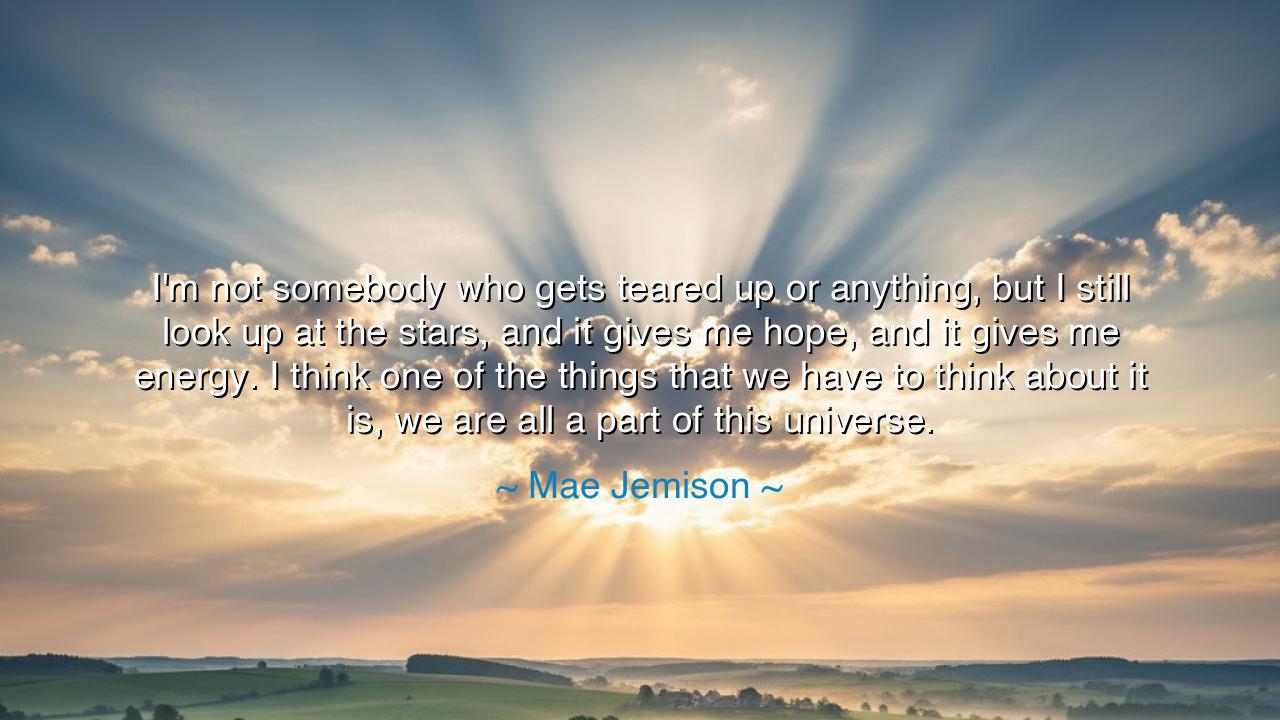
I'm not somebody who gets teared up or anything, but I still look
I'm not somebody who gets teared up or anything, but I still look up at the stars, and it gives me hope, and it gives me energy. I think one of the things that we have to think about it is, we are all a part of this universe.






“I'm not somebody who gets teared up or anything, but I still look up at the stars, and it gives me hope, and it gives me energy. I think one of the things that we have to think about is, we are all a part of this universe.” — Mae Jemison
In these luminous and humble words, Mae Jemison, the first African American woman to travel into space, reminds us of our sacred kinship with the cosmos. Though she speaks with the calm of a scientist, her message resonates like a psalm — a hymn of wonder to the infinite. When she says that she looks up at the stars and finds hope and energy, she is not merely describing the beauty of the night sky; she is describing the profound awakening that occurs when a soul remembers its place in creation. Her insight is both scientific and spiritual: we are not strangers adrift in an indifferent void — we are the universe becoming aware of itself.
To understand the power of her words, we must first remember who Mae Jemison is. A physician, engineer, and astronaut, she carried not only her body but the dreams of countless others into orbit aboard the Space Shuttle Endeavour in 1992. Yet despite her achievements, she speaks with humility, saying she does not “get teared up or anything.” This humility is itself a kind of wisdom — the understanding that awe need not always bring tears, for sometimes it fills us instead with quiet strength. When she gazed out upon the curvature of the Earth, seeing continents and oceans cradled in darkness, she saw what the ancient prophets and poets only imagined: that we are all part of this universe, bound together by light, by dust, by the breath of stars.
The ancients, too, knew this truth in their bones. The philosophers of old, from Heraclitus to Marcus Aurelius, spoke of the cosmos as a living whole, and of humanity as a thread woven through its vast tapestry. The Egyptians watched the stars and believed that the souls of kings became constellations. The Polynesian navigators, guided by the heavens, knew that to sail across an ocean was to move in rhythm with the universe itself. Even now, modern science echoes their wisdom: the atoms in our blood were born in the hearts of dying stars. To look upward, then, is to look inward — to remember where we came from.
Yet Jemison’s message is not only one of wonder; it is one of responsibility. To realize that we are part of the universe is to understand that our actions matter — that the smallest kindness, the simplest act of courage, ripples outward through creation. The stars remind us that we are both insignificant and essential: a single heartbeat in the great symphony of existence. To live with that awareness is to live nobly, to treat the world not as a possession, but as a shared inheritance. Hope and energy arise not from escapism, but from belonging — from knowing that we are participants in something immeasurably larger than ourselves.
Consider the astronauts of the Apollo 8 mission, who in 1968 orbited the moon and sent back the first photograph of Earthrise — the fragile blue sphere rising above the gray lunar horizon. The image changed the world. People saw, perhaps for the first time, their home not as divided nations, but as one planet — delicate, radiant, alive. Wars still raged, and injustice still burned, yet something had shifted. Humanity had glimpsed its own unity. Mae Jemison stands in that same lineage, reminding us that to look up at the stars is not to escape from life, but to see life whole — to draw strength from the infinite so we can return to the finite with renewed purpose.
When she says the stars give her energy, she speaks not of physical power, but of spiritual renewal. For the heavens are mirrors of endurance — patient, silent, yet full of fire. They teach us that creation takes time, that brilliance is born from darkness, and that every spark, no matter how small, can illuminate the void. Hope, then, is not a fleeting emotion but a discipline — the steady gaze toward light, even when surrounded by night. Jemison’s hope is active, creative, and grounded in the knowledge that as long as the stars endure, so too does possibility.
Lesson:
From Mae Jemison’s words, let us learn to lift our eyes and remember our place among the stars. Look upward not in longing, but in recognition — for you, too, are made of celestial dust and ancient fire. Let the vastness of the universe humble you, but also empower you, for your life is part of its unfolding story. Seek hope not in possessions, but in wonder; seek energy not in conquest, but in connection. When despair darkens your path, remember the sky — and know that even the faintest starlight travels unimaginable distances to reach you. You are not alone. You are part of the universe, and the universe lives through you.






AAdministratorAdministrator
Welcome, honored guests. Please leave a comment, we will respond soon